First Health Cluster exhibition held in Gaza Strip and Ramallah
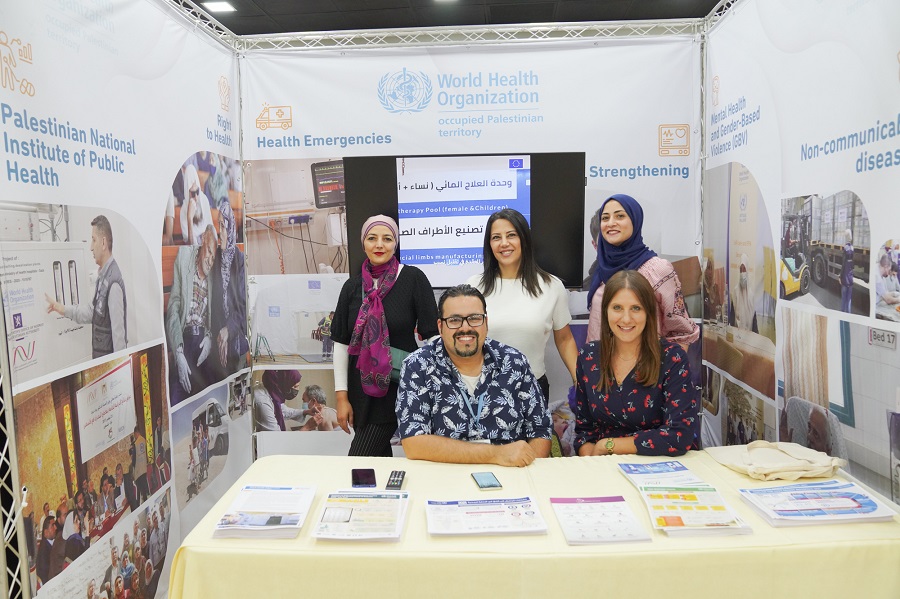
Ramallah, 18 August 2022 – The first-ever Health Cluster exhibition “Collective Action for Better Health” was held in Gaza Strip and Ramallah on 15 and 18 August, respectively. The exhibition was organized by the occupied Palestine territory (oPt) Health Cluster, under the leadership of the Ministry of Health and WHO.
Around 35 partners in the Gaza Strip and 30 in Ramallah showcased their work, which is supporting strengthening of the health system and improving the delivery of health for all. The exhibition provided an opportunity for collaboration and a platform for discussing challenges and existing needs.
“Health Cluster partners are playing an integral role in supporting the provision of health across oPt despite significant challenges. The recent escalations further highlight the enormous need and value of collective action and coordination for effectively addressing humanitarian and health emergencies. Consistent support and increased investment are needed to enhance the preparedness and response capacity of the health system for ensuring delivery of quality health care for all Palestinians,” said Dr Rik Peeperkorn, Representative for WHO oPt.
The oPt Health Cluster is led by WHO, in coordination with the Palestinian Ministry of Health, and comprises 45 active organizations. It was activated in 2009 to support effective coordination of the humanitarian health response, placing affected populations at the heart of decision-making.
The Health Cluster partners’ interventions cover primary and secondary health care, trauma and emergency, disease outbreak, mental health and psychological support, nutrition, and advocacy.
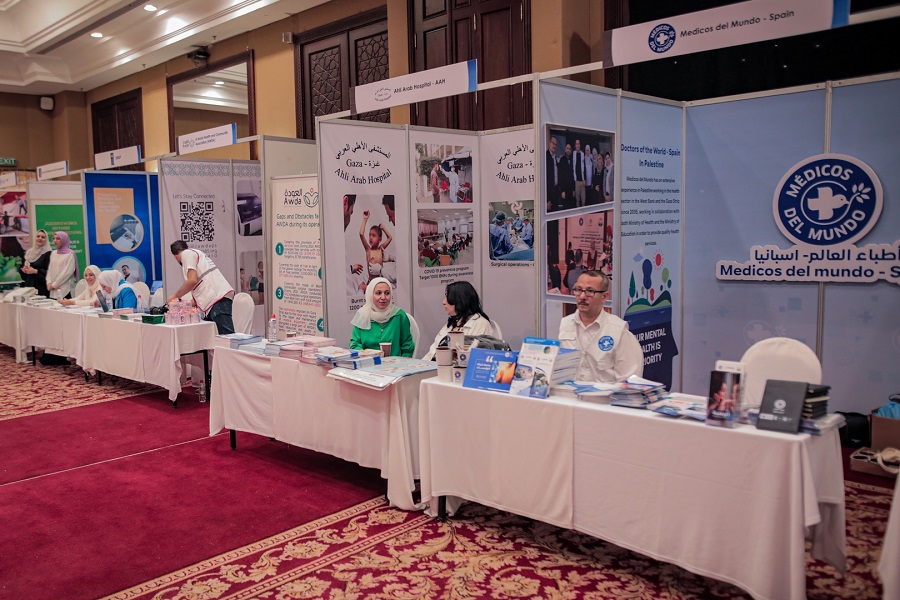
Ahmed, a patient with cancer, delayed critical follow up for four months
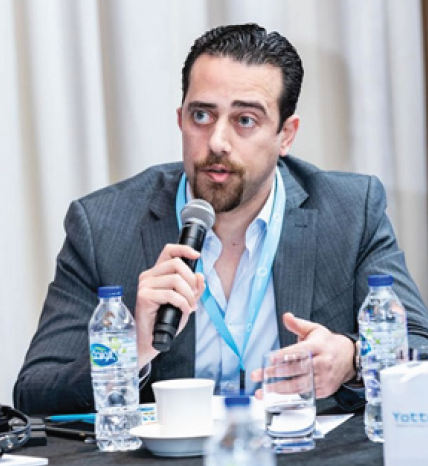 Ahmed is 39 years old and from the Gaza Strip. He was diagnosed with cancer in his right parotid gland in 2013, receiving surgery and treatment in Egypt. In 2016, doctors found a recurrence of his cancer and he had further surgery in 2017 at Assuta Hospital in Tel Aviv. There, Ahmed received medicines, radiotherapy and chemotherapy to increase the chances of being successfully treated and since then has needed regular follow up, including medical imaging (PET scans) not available in the Gaza Strip.
Ahmed is 39 years old and from the Gaza Strip. He was diagnosed with cancer in his right parotid gland in 2013, receiving surgery and treatment in Egypt. In 2016, doctors found a recurrence of his cancer and he had further surgery in 2017 at Assuta Hospital in Tel Aviv. There, Ahmed received medicines, radiotherapy and chemotherapy to increase the chances of being successfully treated and since then has needed regular follow up, including medical imaging (PET scans) not available in the Gaza Strip.
In July 2021, doctors at Assuta Hospital found that Ahmed’s cancer had spread to his lungs. He was treated with further radiotherapy and scheduled for follow up PET scans at 6 months and at 1 year.
“I lost two hospital appointments in May and July. Doctors told me that follow up is critical in my case. I need a PET scan to look for nodules on the lung. Then I would need to see an oncologist and an ear, nose and throat specialist.”
Ahmed had an appointment scheduled for 23 August, but was notified that his application was under study.
“For me, as a young person and a father of three young children, my health means everything. It means my ability to work, my ability to make an income, my ability to support my family and to support my children as they grow up and become independent.”
In July alone, nearly 2,000 patients from across the occupied Palestinian territory were prevented from accessing essential health care because of the delay and denial of permits by Israel.
Health is a fundamental right. Arbitrary delay and denial of access for Palestinian patients must end. We should all have unhindered access to the health care we need.
WHO supports Gaza’s public hospitals to better respond to the recent escalation of hostilities
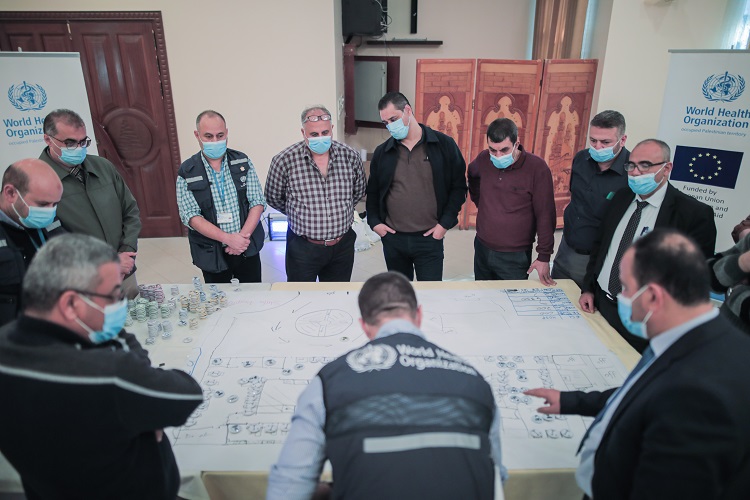 Tabletop simulation during the WHO mass casualty management training for Gaza public hospitals, March 2022, Gaza Strip. Credit: WHO
Tabletop simulation during the WHO mass casualty management training for Gaza public hospitals, March 2022, Gaza Strip. Credit: WHO
23 August 2022 – The World Health Organization (WHO)’s long-term support for increased preparedness and response capacity in the occupied Palestinian territory, including the Gaza Strip, proved vital during the escalation of violence from 5 to 7 August 2022. This ongoing work has enabled hospitals to activate mass casualty management plans, prepositioned supplies to be mobilized, and urgent provisions to be delivered to hospitals, attesting to real change on the ground in the way health care workers are able to respond in the sudden onset of disaster.
Distance training works
WHO began delivering virtual mass casualty management training courses in 2020, in conjunction with the NYC Medics Global Disaster Relief. This online training proved its effectiveness during the May 2021 escalation, when trained health care workers were shown to perform at a higher level.
WHO then followed up with in-person training to equip hospitals with a standardized, unified mass casualty management plan allowing efficient response to complex emergencies such as the current one. Six (6) out of 7 hospitals in Gaza and 2 out of the 8 targeted hospitals in the West Bank have now been upscaled with mass casualty management training and plans based on the WHO Academy training guidelines, with additional technical support from the Trauma Operational Advisory Team (TOpAT) based in WHO’s Regional Office for the Eastern Mediterranean.
Emergency medical teams
Another significant WHO investment in increasing the preparedness of the health system when faced with emergencies was the development of 2 national emergency medical teams (EMTs) in the Gaza Strip with tailored training and standard operating procedures combined with the prepositioning of equipment and supplies. With support from the European Civil Protection and Humanitarian Aid Operations (ECHO), Swiss Development Cooperation (SDC) and the Italian Agency for Development Cooperation (AICS), critical stocks are replenished for use in times of crisis.
WHO has initiated the process through which the 2 EMTs will become WHO-verified as national EMTs testifying for the increased preparedness of the health system in the Gaza Strip.
With endorsement from the Ministry of Health to the EMTs initiative at high level, a number of various health professionals – doctors, nurses, logisticians and pharmacists already working at different primary health care levels, ambulance services or hospitals – were pre-identified as the EMT members and ready for deployment when triggered.
A paradigm shift
Due to the sheer volume and urgency of cases, hospitals responding to mass casualties require a different mindset altogether involving the hospital manager, heads of departments (including the Emergency Department), nurses working in the ICU, pharmacists, laboratory workers, and logisticians. With the WHO-provided training, heads of emergency departments receiving casualties are now equipped with the level-headedness that results from a structured approach, an understanding of the trigger points for various response levels and an awareness that each level is backed by specific plans to be carried out by trained workers – in addition to the existence of EMTs to be deployed as the need arises to support any echelon of health care, from the pre-hospital level to rehabilitation, and post-discharge from the hospital.
An ongoing process
Continuously reeling from one cycle of escalation to another, the health care system in Gaza is in a protracted crisis causing chronic shortages of health care supplies and medicines. The impossible decision of whether to utilize available supplies and medicines for ongoing patient treatment or to stock them in readiness for the next crisis must often be made. Additionally, despite prepositioning some equipment and supplies in stock, they can only suffice for one or two days of mass casualties before additional external support becomes necessary.
WHO’s immediate response to the surge in needs
On the second day of the recent escalations, the Ministry of Health mobilized some of the EMTs’ pre-stocked tents, supplies and equipment to expand the capacity of the emergency departments of 3 public hospitals by setting up a supplementary management area beside the Emergency Department to cope with the surge in casualties. In response to the Ministry of Health’s appeal, WHO immediately allocated emergency funds for the procurement of critically needed medicines, equipment and supplies, and is in the process of mobilizing an additional US$ 1.2 million to respond to part of the Ministry’s appeal.
Health Workers’ Training Begins on the National Guideline on Infection Prevention and Control
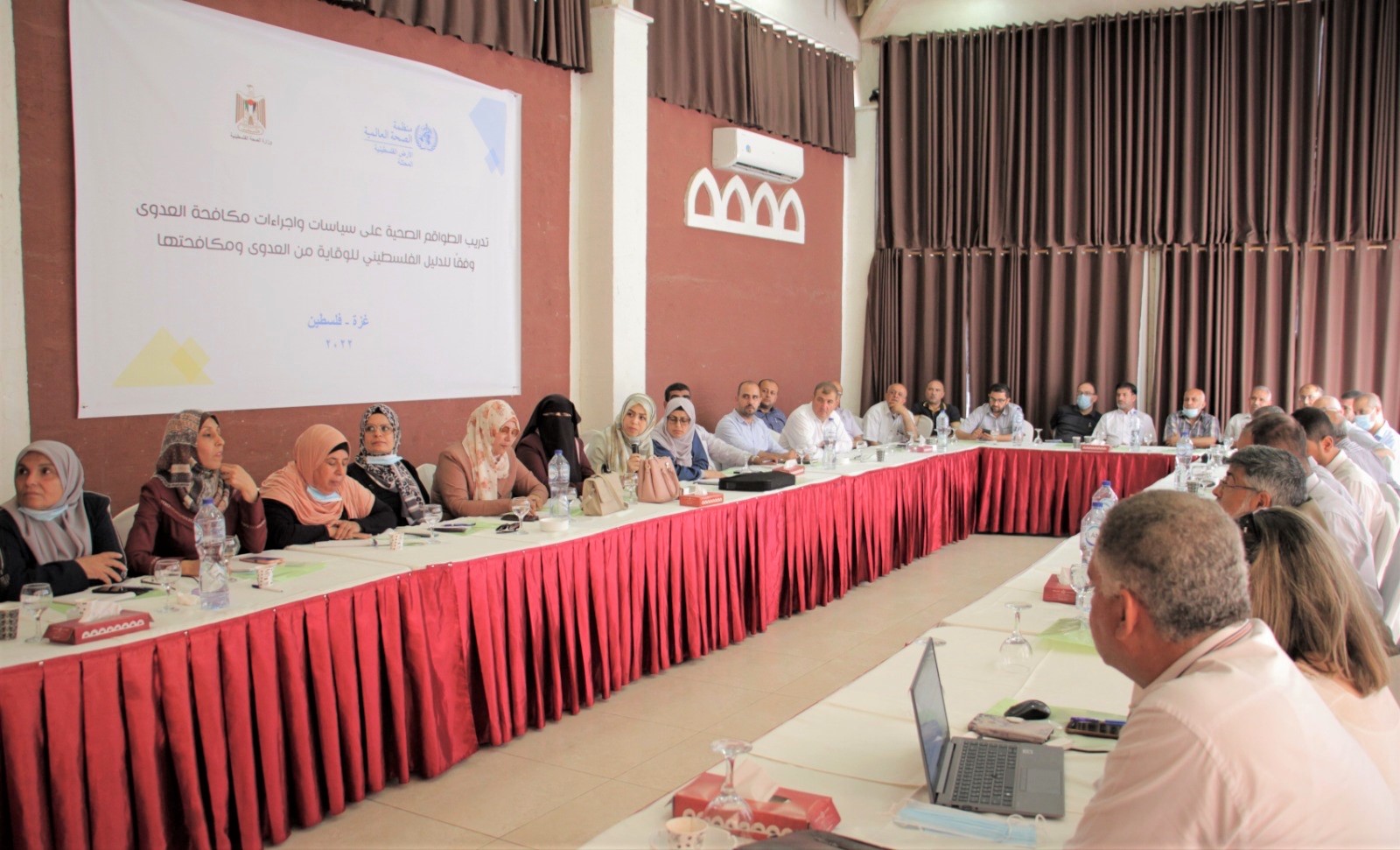
July 2022, Gaza - Recently, the World Health Organization in the occupied Palestinian territory (WHO oPt) and the Ministry of Health (MoH) commenced a series of trainings in Gaza on the National Guideline on Infection Prevention and Control.
The trainings are part of ongoing efforts to strengthen the health system and improve health workers’ capacity. Effective implementation of the Guideline at health facilities across Gaza will contribute to decreasing the transmission of diseases, improving the quality of health service provision, and institutionalization of infection prevention and control measures at health facilities and within the MoH.
The first of 17 trainings was completed in June, with the remaining scheduled to be finished by the end of 2022. More than 600 health staff will be capacitated through these trainings.
The National Guideline on Infection Prevention and Control has been developed by the Ministry of Health in collaboration with WHO oPt, to provide clear protocols to control the transmission of diseases.








